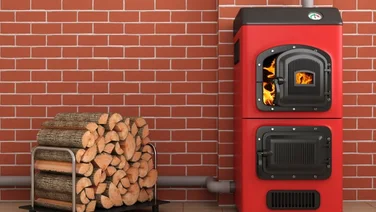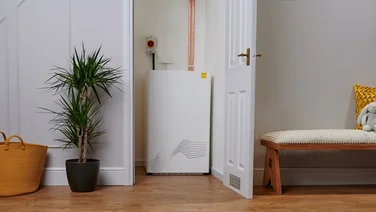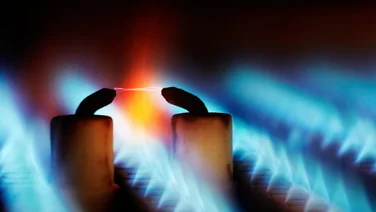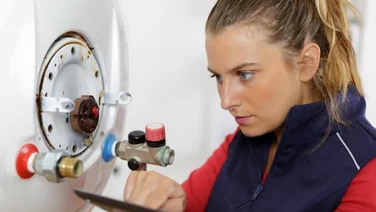✔ A system boiler is ideal for a three-bedroom house
✔ System boilers typically cost around £900, plus approximately £2,000 installation cost
✔ Fill in the short form above to receive free boiler quotes from our professional installers
You can go for years without thinking about your boiler. It ticks away quietly in the background, keeping you warm and watered, until one day it conks out and you’re frantically researching the cost of a new boiler.
On this page, we’ll tell you everything you need to know about system boilers, which are perfectly suited to medium-sized homes (i.e. three-bedroom houses). We’re going to talk about how they work, how they compare to other types of boiler, and how much they typically cost. We’ll also explore the best system boilers of 2019.
To start receiving free quotes for installing a new boiler, fill in the short form, and our professional installers will be in touch.

What’s on this page?
Click the links below to head for a specific section.
- 01 | What is a system boiler?
- 02 | System boilers vs other types
- 03 | Pros and cons of system boilers
- 04 | Is a system boiler right for you?
- 05 | How much does a new system boiler cost?
- 06 | The best system boilers in 2019
- 07 | System boiler grants
- 08 | Problems with system boilers (FAQs)
- 09 | Finding a boiler installer
What is a system boiler?
A system boiler is built to supply multiple bathrooms with high water pressure, without being as big as a conventional boiler.
Unlike a conventional boiler, which requires hot and cold water tanks, a system boiler needs only a hot water tank.
Although the majority of a system boiler’s components are built into a single unit, the external hot water tank means that a system boiler is not as compact as a combi boiler.
Read about the cost of a new boiler here for all the information you’ll need on what you might spend.
System boilers have an efficiency rating of 94%. You can boost your home’s efficiency by investing in a new energy saving system boiler. Just get in contact with our professional installers, and they’ll provide you with a free quote.
How does it work?
A system boiler takes water directly from the mains and heats it up with a ‘heat exchanger’ (which operates on gas, oil, or electricity), before sending the hot water into a tank (or ‘cylinder’). This tank means that there’s always a steady supply of hot water available for multiple simultaneous showers and baths.
Of course, a system boiler also powers your central heating. So, while some of the water goes into a tank for your own personal use, the rest of it gets sent to the radiators around your home.
If you think the hot water tank sounds like it might take up too much space at home, you could opt for a combi boiler, but this is only suitable for one- or two-bedroom households.
Check out the diagram below to get an idea of how a system boiler works. We appear to have chosen quite an austere-looking house to illustrate this, but it does the trick.

How is it installed?
Fortunately, installing a system boiler is usually quicker and easier than installing a conventional boiler. This is because most of a system boiler’s key components (e.g. its pump and expansion vessel) are built into the main unit, so the whole process is way less fiddly.
The main unit will usually be mounted on the wall in a kitchen (sometimes inside a cupboard), while the hot water tank goes somewhere else – usually an airing cupboard.
Not that you need to worry particularly about what the installation process is like, as you’ll be getting a professional engineer to do this for you. Plus, if it’s a gas-powered boiler, it’s essential that you use the services of a Gas Safe Registered engineer.
What is a condensing system boiler?
If you are considering a gas system boiler, then it’s a legal requirement in the UK that your boiler is condensing.
This simply means that the boiler reuses the heat that comes from its exhaust gases, rather than just expelling them into the atmosphere. A condensing boiler is naturally much more efficient than a non-condensing boiler, hence the government having a law about it (since April 2007).
In fact, according to Which? and the Energy Saving Trust, replacing a G-rated non-condensing boiler with a new condensing boiler could save you up to £380 per year on energy bills.
System boilers vs other types
We put the system boiler in a head-to-head with the other types of boiler, and assessed them all based on their typical price, noisiness, eco-friendliness, and ErP ratings (find out what that means below). Just to clarify, the higher the star rating, the less noisy the boiler is.
Please note that all the below values are averages only.
|
Type of boiler |
Energy efficiency |
ErP rating |
Price |
Installation cost |
Noise |
Eco-friendliness |
|---|---|---|---|---|---|---|
| System | 94% | A | £900 | £2,000 | ★★★ | ★★★★ |
| Combi | 95% | AA | £700 | £1,850 | ★★★★ | ★★★★★ |
| Conventional | 93% | A | £900 | £2,250 | ★★ | ★★★★ |
Information updated in September 2019.
We also took the four main ways of powering a boiler and put them through the same comparison.
|
Type of boiler |
Energy efficiency |
ErP rating |
Price |
Installation cost |
Noise |
Eco-friendliness |
|---|---|---|---|---|---|---|
| Gas | 94.5% | AA | £830 | £2,000 | ★★★ | ★★★ |
| Electric | 99% | D | £800 | £2,750 | ★★★★★ | ★★★½ |
| Oil | 91.6% | A | £1,800 | £2,800 | ★★ | ★ |
| Biomass | 93.5% | A+ | £10,000 | £2,250 | ★ | ★★ |
Information updated in September 2019.
You’ll notice that electric boilers perform rather strangely, with a typically high ErP efficiency rating and a low ErP rating. This is because electric boilers are excellent at not wasting any energy, but their original source of energy is usually fossil fuels, which are terrible.
Even if your boiler is running off solar-generated or wind-generated electricity, it will still receive a D rating, because this is the grade given to all electricity, irrespective of how it’s created. That’s right – the bad electricity brings things down for all electricity.
See below for a breakdown of the key aspects that we’ve used to assess system boilers. Some of these don’t feature in the tables above, but you’ll certainly find them in our more technical tables further down the page (where we discuss specific boiler models).
How do we assess system boilers?
Price
Probably the most important factor when it comes to any household purchase: how much is it going to cost you? You can calculate your family’s hot water requirements until the cows come home, but it’s the price tag that will ultimately determine your choice of new boiler.
ErP rating
This rating system, created by the European Union, assesses Energy-related Products (ErPs) on two capabilities: central heating and hot water. Ideally, you should be looking for a Grade A in both.
Energy efficiency
A boiler’s ‘energy efficiency’ refers to the proportion of fuel it manages to turn into useable energy (vs the amount of fuel that gets wasted). It’s expressed as a percentage, and UK law states that all domestic boilers have to be at least 92% efficient.

Noise
Every boiler makes a sound, and some are much louder than others. In the tables above, we’ve expressed noise as a star rating (the higher the rating, the less noise), but down in the more technical tables below, you’ll see it written in decibels (dB). If this bamboozles you, know that normal conversation tends to range between 40-60dB.
Output
Usually expressed in kilowatts (i.e. 1,000 watts), a boiler’s power output basically equates to how much hot water it can produce at any given time. For example, a one-bedroom or two-bedroom house will usually require a 24-27kW boiler, which is capable of running around 10 radiators and one bathroom.
Meanwhile, a house with two or three bathrooms will need a 28-34kW boiler.
Nitrogen oxides
Unfortunately, all boilers pump out harmful nitrogen oxide (NOx) into the atmosphere. It’s measured in milligrams per kilowatt-hour, and the figures can vary considerably across different models of boiler. Ideally, you should aim for something below 40 mg/kW.
Size
You always need to make room for a boiler – within reason. They can range in size from small white boxes to great heat-giving behemoths. Fortunately, bigger houses with larger hot water requirements usually have more space for a hefty boiler.
Pros and cons of system boilers
Like any type of boiler, a system boiler comes with its advantages and disadvantages. Here are the pros and cons you should consider before buying a system boiler:
- It can handle high demand
- High efficiency
- Compatible with solar thermal
- It requires space
- Limited tank capacity
- Less efficient than a combi
As you can see, the pros and cons of system boilers are relatively balanced. A system boiler’s large tank of hot water means that it’s capable of dealing with multiple requests at once, without a drop in pressure. Two simultaneous showers and a hot tap? That’s no problem for a system boiler. Generally speaking, system boilers tend to be very efficient machines, capable of turning the majority of their fuel into heat for your home, without much waste.
On top of all this, the average system boiler will offer higher efficiency than a conventional alternative. If you fancy joining forces with the eco-conscious, a system boiler will support you all the way. You can even connect solar thermal panels to the boiler’s hot water tank, so your morning shower will basically be powered by the sun.
On the other hand, you’ll only have as much hot water as your hot water tank can offer, before it needs to resupply and reheat again. It’s recommended that a household of 2-3 people get a 40-50 gallon tank, but a system boiler usually resupplies overnight, so you’ll rarely ever notice it running out of hot water when you need it.
Despite it’s high efficiency rating, if it’s energy efficiency that you’re after, a combi boiler is your best bet. Combi boilers tend to achieve around 95% efficiency, while system boilers average around 94%.
Is a system boiler right for you?
If you’re wondering whether a system boiler is right for your household, you need to ask yourself these two questions.
1. Do you have more than one bathroom?
If you have two or more bathrooms that are regularly used simultaneously, you should stop thinking about a combi boiler and start thinking about a system boiler.
A system boiler is equipped to provide hot water with high pressure to multiple outlets, so you and your family can wash yourselves without ruining each other’s showers.
2. Do you have enough space?
If you get a system boiler, you can put the main unit in your kitchen, but you also need to find space for the hot water tank.
Of course, the size of the tank will vary depending on your needs, but a household of 2-3 people will usually need a 40-50 gallon tank. Bear in mind that 45 gallons is about 200 litres, or 0.2 cubic metres.
How much does a new system boiler cost?
A new system boiler costs approximately £900, but prices can reach up to £3,500, depending on the boiler’s size, efficiency, and power. Along with the cost of the boiler itself, there’s also the cost of installation, which is typically around £2,000.
Of course, the installation cost will depend on what type of boiler you’re replacing. If you’re swapping out an old system boiler for a new one, then the process will be less elaborate than if you’re switching from a combi to a system.
To find out more, take a look at our full page about the cost of a new boiler.
Cheap system boilers
If you’re looking for a system boiler that’s affordable and reliable, check out the Ideal Logic+ System.
The Logic+ is available in four different outputs (15kW, 18kW, 24kW, 30kW). It’s easy to install, and the main unit fits easily inside a kitchen cupboard. It doesn’t come with many components, which minimizes the risk of anything breaking, and there’s an easy-to-see pressure gauge.
The data below is for the 15kW model.
|
Feature |
Ideal Logic+ 15kW |
|---|---|
| ErP rating | A |
| Fuel | Gas |
| Noise (decibels) | 44 |
| ErP efficiency | 93% |
| Power output (kW) | 15 |
| Nitogen oxides (mg/kWh) | 24 |
| Size (mm) | 700 x 395 x 278 |
| Weight (kg) | 26.2 |
| Typical price | £790.25* |
| Warranty | 2 years for parts and labour** |
*Price information sourced from www.plumbnation.co.uk. Excluding the cost of installation.
**Available when registered within 30 days of installation and serviced annually.
The best system boilers in 2019
We’ve scoured the market and handpicked the seven best system boilers of 2019, based on key features such as efficiency, power output, warranty, and price. All information has been sourced from the boiler models’ official datasheets, apart from the prices, which are from www.plumbnation.co.uk (excluding the cost of installation).
We’ve ranked the boilers in terms of their efficiency, but other features might be more important to you.
This is by no means an exhaustive list, and you can learn more in our complete guide to the best boilers, which includes combi and conventional boilers, too.
|
Manufacturer |
Model |
Power outputs |
ErP efficiency |
Warranty* |
Best for |
|---|---|---|---|---|---|
| Viessmann | Vitodens 100-W | 19-35kW | 97% | Up to 10 years | 3-bedroom houses |
| Grant | VortexBlue Internal | 21-36kW | 94.56% | Up to 10 years | Off-grid houses |
| Worcester Bosch | Greenstar 8000 Style | 30-50kW | 94% | Up to 7 years | Aesthetics |
| Glow-worm | Easicom₃ | 24-28kW | 94% | Up to 6 years | A bit of everything |
| Worcester Bosch | Greenstar 12i | 9.2-18kW | 94% | Up to 7 years | Smaller houses |
| Vaillant | ecoTEC plus | 12-37kW | 92% | Up to 10 years | Minimal noise |
| Baxi | Megaflo | 15-32kW | 92% | Up to 7 years | Customer support |
*The maximum warranty available on any boiler model is usually dependent on particular conditions, such as using the manufacturer’s own registered installers.
That’s a swift breakdown of the magnificent seven, but here’s a little bit more detail about each of the boilers, including the best options for smaller and larger homes.
Viessmann Vitodens 100-W
The best system boiler for a three-bedroom house
If you’re looking for a system boiler to power your three-bedroom home, Viessmann’s Vitodens 100-W should do the trick. Made in Germany, the compact and highly efficient Vitodens 100-W is a top-notch system boiler.
You can mount it on the wall in your kitchen, and there’s easy access via the front of the boiler, so you don’t need to leave space at the side of the unit for maintenance.
The Vitodens 100-W also comes with an optional ‘tado° Smart Thermostat’, which pairs up with an app to help you control your heating from your smartphone. Pretty handy if you want to turn the heating up while you’re in bed.
You can get the Vitodens 100-W in four different power outputs: 19kW, 26kW, 30kW, and 35kW. The data below is for the 35kW model.
|
Feature |
Viessmann Vitodens 100-W |
|---|---|
| ErP rating | A |
| Fuel | Gas |
| Noise (decibels) | 49 |
| ErP efficiency | 97% |
| Power output (kW) | 35 |
| Nitogen oxides (mg/kWh) | <39 |
| Size (mm) | 700 x 400 x 350 |
| Weight (kg) | 37 |
| Typical price* | £1,233.36 |
| Warranty | Up to 10 years if installed by a Viessman Trained Installer |
Grant VortexBlue Internal
The best system boiler for off-grid households
This oil-powered boiler is great for households located off-grid, where gas isn’t an option.
Oil boilers don’t have a great reputation for nitrogen oxide (NOx) emissions, but Grant’s VortexBlue Internal System boiler operates on (comparatively) low-NOx ‘Blue Flame’ technology. Grant’s R&D team spent two years developing the compact ‘Blue Flame burner’, and it’s really raised the game for the oil boiler market.
Grant’s oil boilers have won a Which? ‘Best Buy’ award for two consecutive years (2017 and 2018), so you’ve also got a vote of confidence from the UK’s largest consumer organisation.
The VortexBlue Internal comes in three different power outputs: 21kW, 26kW, and 36kW. The data below is for the 36kW model.
|
Feature |
Grant VortexBlue Internal System 36kW |
|---|---|
| ErP rating | A |
| Fuel | Oil |
| Noise (decibels) | 53.7 |
| ErP efficiency | 94.56% |
| Power output (kW) | 36 |
| Nitogen oxides (mg/kWh) | 74 |
| Size (mm) | 900 x 470 x 603 |
| Weight (kg) | 144 |
| Typical price* | £2,371.91 |
| Warranty | 10 years when installed by a G1 accredited installer |
Worcester Bosch Greenstar 8000 Style
The best system boiler for aesthetics
Fairly new to Worcester Bosch’s boiler range, the Greenstar 8000 Style is about as extravagant as its name implies, offering a gorgeous black sheen that’s perfect for style-conscious homeowners. What’s more, the boiler control display isn’t just backlit – it’s in colour. Take one look at this thing and you won’t want to hide it away in a cupboard.
Aside from its dazzling appearance, the Greenstar 8000 Style is equally big on performance. Boasting a ‘Greenstar Intelligent Filling System’, the boiler is built to self-correct its own pressure problems.
That’s right: whenever there’s a significant drop in water pressure, the internal filling valve responds automatically and starts refilling the system. This means far fewer callouts for engineers (or your own dodgy attempts at manual refills).
The Greenstar 8000 Style is available in two different capacities: 30kW and 35kW. The data below is for the 30kW model.
|
Feature |
Worcester Bosch Greenstar 8000 Style 30kW |
|---|---|
| ErP rating | A |
| Fuel | Gas |
| Noise (decibels) | 53 |
| ErP efficiency | 94% |
| Power output (kW) | 30 |
| Nitogen oxides (mg/kWh) | 23 |
| Size (mm) | 780 x 440 x 365 |
| Weight (kg) | 46 |
| Typical price* | £1,411.76 |
| Warranty | 5 years standard, 7 years when you register the appliance with Worcester Bosch |
Glow-worm Easicom₃
The best all-round system boiler
Glow-worm’s Easicom₃ manages to tick every box quite comfortably. Equipped with an easy-to-use LCD interface, a super compact design (just 22kg), and an impressive efficiency of 94%, Glow-worm’s leading system boiler will heat your home rather nicely.
It’s extremely reliable, too, going through exactly 499 quality checks before leaving Glow-worm’s award-winning factory in the UK. The Easicom₃ is available in just the one capacity: 25kW.
|
Feature |
Glow-worm Easicom₃ 25kW |
|---|---|
| ErP rating | A |
| Fuel | Gas |
| Noise (decibels) | 51 |
| ErP efficiency | 94% |
| Power output (kW) | 25 |
| Nitogen oxides (mg/kWh) | 39 |
| Size (mm) | 740 x 418 x 300 |
| Weight (kg) | 22 |
| Typical price* | £914.46 |
| Warranty | 3 years (when installed by a Club Energy installer), with options to extend to 6 years |
Worcester Bosch Greenstar 12i
The best system boiler for a one-bedroom or two-bedroom house
Worcester Bosch’s Greenstar 12i system boiler is perfectly designed to power a small home. It’s available in a bitesize 9kW capacity, along with five other options: 12kW, 15kW, 18kW, 21kW, and 24kW. If you’re living with just one other person (but have more than one bathroom), the Greenstar 12i is ideal.
The boiler comes with simple controls, a high-efficiency aluminium-silicon heat exchanger, and a recommendation from the Energy Saving Trust. The data below is for the 9kW model.
|
Feature |
Worcester Bosch Greenstar 12i System 9kW |
|---|---|
| ErP rating | A |
| Fuel | Gas |
| Noise (decibels) | 49 |
| ErP efficiency | 93% |
| Power output (kW) | 9.2 |
| Nitogen oxides (mg/kWh) | 32 |
| Size (mm) | 710 x 400 x 330 |
| Weight (kg) | 30.9 |
| Typical price* | £982.70 |
| Warranty | Up to 7 years, T&Cs apply |
Vaillant ecoTEC plus
The best system boiler for minimal noise
Vaillant’s ecoTEC plus is as smart as it sounds. It’s capable of detecting when you don’t require much heating power, and using just 16% of its capacity (to save on money and fuel).
The boiler also comes with a Quiet Mark accreditation, which is an international award given to “low-noise, high-performance technology” – and with just 43 decibels of noise, the ecoTEC plus basically sounds like a quiet conversation in your cupboard.
You can get the ecoTEC plus in six different capacities: 12kW, 15kW, 18kW, 24kW, 30kW, or 37kW. The data below is for the 12kW model.
|
Feature |
Vaillant ecoTEC plus 12kW |
|---|---|
| ErP rating | A |
| Fuel | Gas |
| Noise (decibels) | 43 |
| ErP efficiency | 92% |
| Power output (kW) | 12 |
| Nitogen oxides (mg/kWh) | 26 |
| Size (mm) | 720 x 440 x 338 |
| Weight (kg) | 36 |
| Typical price* | £781.81 |
| Warranty | 5 years standard, 7-10 years when you book a Vaillant Advance installer |
Baxi Megaflo
The best system boiler for customer support
The Baxi Megaflo boiler itself does not provide any customer support, but should you encounter any issues, Baxi’s award-winning customer service division will always be there to help. The lovely people there are even available between Christmas and New Year, from 8.30am to 2pm.
The Megaflo offers a decent efficiency of 92%, a middling noise level of 54 decibels, and five different capacities: 15kW, 18kW, 24kW, 28kW, and 32kW. The data below is for the 32kW model.
|
Feature |
Baxi Megaflo System 32kW |
|---|---|
| ErP rating | A |
| Fuel | Gas |
| Noise (decibels) | 54 |
| ErP efficiency | 92% |
| Power output (kW) | 32 |
| Nitogen oxides (mg/kWh) | 24 |
| Size (mm) | 780 x 450 x 345 |
| Weight (kg) | 38.4 |
| Typical price* | £1,117.98 |
| Warranty | 7 year warranty available until the end of 2019, T&Cs apply |
System boiler grants
If you don’t think you can afford the cost of a new boiler upfront, the UK Government’s Energy Company Obligation (ECO) scheme could help you. So long as you meet certain requirements, you could have your old, inefficient boiler replaced for free (or at least significantly subsidised).
What are the requirements? Most importantly, you need to be living in social housing, and own a non-condensing boiler that is at least five years old. Check out the official government page to apply for a grant, although bear in mind that funding for oil/LPG boilers will conclude in September 2019. After that, it’s gas only.
Problems with system boilers (FAQs)
What temperature should a system boiler be set at?
It’s recommended that your boiler be set to around 82°C in winter and 65°C in summer. Bear in mind that, for every degree that you increase your boiler’s temperature, you will end up paying an extra £60 approx. on annual energy bills.
Meanwhile, a household’s thermostat should ideally be around 21 degrees, although this is of course down to personal preference.
Why is my system boiler leaking?
If your system boiler is leaking, that most likely means a valve or seal has broken. The escaping water will gradually cause rusting of other components, and could potentially short electrical elements.
If the leak is coming from the pressure valve, this could mean that your boiler’s pressure is too high. You should check your pressure gauge and make sure that the dial is on the green section (i.e. at around one bar of pressure).
Bleeding your radiators will help to reduce the pressure, but you should still have a Gas Safe registered engineer come out to take a look.
A leak might also be caused by corroded pipes. If you’re lucky, this corrosion will be isolated to one part of the boiler, and you can have that section replaced. However, if the corrosion is widespread, you may need to replace the entire boiler.
Poor installation can also lead to leaks, particularly if certain pipe fittings have not been connected properly. You can avoid this issue by making sure that you use reliable, professional installers when you first get the boiler installed.
Whatever the cause of the leak, it’s vital that you get it sorted ASAP.
Why is my system boiler losing pressure?
The two most common causes of boiler pressure drops are 1) leaks, and 2) bleeding radiators.
To identify any possible leaks, look around your house for signs of damp, particularly near radiators, pipes, and the boiler. If you find anything, you can patch it up in the short term, but you’ll need to have a Gas Safe registered engineer come out to deal with it properly.
This is especially the case if the leak is coming from a gas boiler, and/or is located inside your boiler.
If you’ve bled any of your radiators recently, this may have caused a reduction in your boiler system’s pressure. You can refill the pressure via your boiler’s filling loop, but this isn’t recommended unless you’re confident about what you’re doing. The safest bet is always to call out a Gas Safe registered engineer.
Why does my system boiler have no hot water?
There’s a handful of likely reasons why your boiler’s stopped producing hot water.
Sometimes, the temperature dial has accidentally been knocked to a colder setting, or the timer has got confused after the clocks have gone backwards/forwards.
If you have a gas boiler, then the pilot light (i.e. the flame that ignites the gas) may have gone out. To relight this, you can follow the instructions that are specific to your model of boiler, but we strongly recommend that you call out a Gas Safe registered engineer to do it for you.
The best system boilers in 2019
If a system boiler sounds like the right thing for your home, your next step is to find the right model and a reliable installer – all for a competitive price. That’s where we come in. Simply fill in this short form, and our handy bunch of local, professional installers will be in touch with free boiler quotes. Happy heating!






